Unfortunately, this is now a habit. After each attack, we learn that the terrorists had either met, documented, coordinated or enlisted through social networks. After the latest attack in London, British Prime Minister Theresa May was quick to point out the giants of the web, while the French President, Emmanuel Macron, asked the internet networks to be more firm in controlling the accounts they host. So are social networks the cause, catalyst or even accomplice of terrorists? The answer to this question is not self-evident.
Rs seven largest countries called for social networks to be made available to the public in Italy a few days ago in Taormina, Italy. significantly increase their efforts against terrorist content "...including"... developing technologies for automatic detection of incitement to violence ». Theresa May calls to " regulate cyberspace " while British MPs accuse the networks of " let it happen ». During his campaign, Emmanuel Macron urged Internet companies to remove Islamist propaganda content without delay. Germany, for its part, wants to hit operators in the wallet and is threatening the networks with huge fines if they allow illegal and especially terrorist content to be accessed.
Faced with these accusations, the major digital platforms are defending themselves because the situation has changed in a few years. Until recently, the giants of the Internet were wrapped in the dogma of absolute respect for freedom of expression. This dogma was all the stronger among the Anglo-Saxons and even more so among the community of the historic founders of the Internet. But, in the face of the multiplication of violent and tragic events, the situation has changed.
The rules of major social networks such as Facebook, Twitter or YouTube have been changed. They define what content is allowed and now very clearly prohibit terrorist apology or propaganda. After the accusations by Theresa May, Facebook's director of public affairs, Simon Milner, said that he was "very concerned about the lack of transparency and accountability in the use of Facebook's social media. The World...to say that he wants " Facebook is a hostile environment for terrorists ". " We remove terrorist content from the platforms as soon as we learn of its existence. "he says. His Twitter buddy doesn't say it any better: " Terrorist content has no place on Twitter. ".
It is true that under the pressure of events, opinions and governments, social networks have decided to take serious initiatives. Twitter announced at the end of March that it had suspended 377,000 accounts inciting terrorism during the second half of 2016. Facebook and YouTube launched an algorithm at the end of 2016 capable of automatically detecting and deleting all content containing Islamist propaganda or incitement to violence. Mark Zuckerberg's network also announced at the end of May the hiring of 3,000 "little hands", Facebook spies, to provide human support for algorithmic surveillance.
The signs of a recovery are multiplying. Several police units in different States have developed protocols for alerting social networks to illegal content. 91 % of them are reportedly being followed up.
But what is the real impact of these measures on terrorism? Surveillance of networks can only be carried out after the fact, when illegal content is reported. But it is impossible and undesirable for a priori censorship to be applied. On the other hand, the role of the Internet in radicalization is not clearly demonstrated. The expert on the issue is Canadian researcher Benjamin Ducol, head of research at the Centre for the Prevention of Radicalization Leading to Violence (CPRMV), located in Montreal. Ducol says Internet plays a role, but not always a major one ".
Questioned by the newspaper The Crosshe explains that the major risk of the Internet lies in the fact that it allows you to enter a "cognitive bubble": " The Internet reinforces the ideas that one has, because, through the effect of social networks and algorithms, it automatically proposes content related to previous searches or contacts, and excludes any deviant proposals. The Internet can lock people into a way of thinking ".
Whether it is supported or amplified by the Internet, the radicalisation process does not start from scratch in any case, experts agree. « Behind every radicalisation process there is a fertile ground that makes some individuals more (pre)willing than others to embark on the path of radicalisation.
However, this fertile soil varies greatly from one individual to another, as a result of the social, family, cultural, relational and psychological conditions of each individual.. », says Benjamin Ducol. He goes on to say: « In the vast majority of cases, the Internet thus operates as a catalyst rather than as a primary cause of adherence to an extremist cause. For individuals already convinced or in the process of being convinced, the web becomes a ground where an identity fantasy can freely develop: that of being part of a grandiloquent collective cause (jihad, the defence of an identity purity, etc.) requiring full commitment. [...] No one becomes a jihadist, however, just because of the web and social media. What the web produces is this monstrous amalgam between a fantasized ideological narrative of the world (jihadism, extreme right-wing identity, exacerbated ultranationalism, etc.) and individuals who are often vulnerable, naïve or predisposed to believe the discourse to which they are exposed online. In the absence of any critical perspective, individuals come to take at face value the arguments and justifications that are cross-justified on the Internet.. »
Cause, catalyst, accelerator? is the problem of the influence of social networks on Islamist terrorism a real false problem? Terrorists are not born from networks, but networks are very useful to them in order to develop. To such an extent that, faced with the rise in power of retaliatory measures put in place by the major web operators against Islamic propaganda, Daech would undertake to create its own social network! This is what Europol suspects, having detected a suspicious social platform. According to the agency ReutersIn the future, some members of the Islamic State would actively participate in the development of this new network, which would be a major blow to the major social networks of the world. The war is not over...













